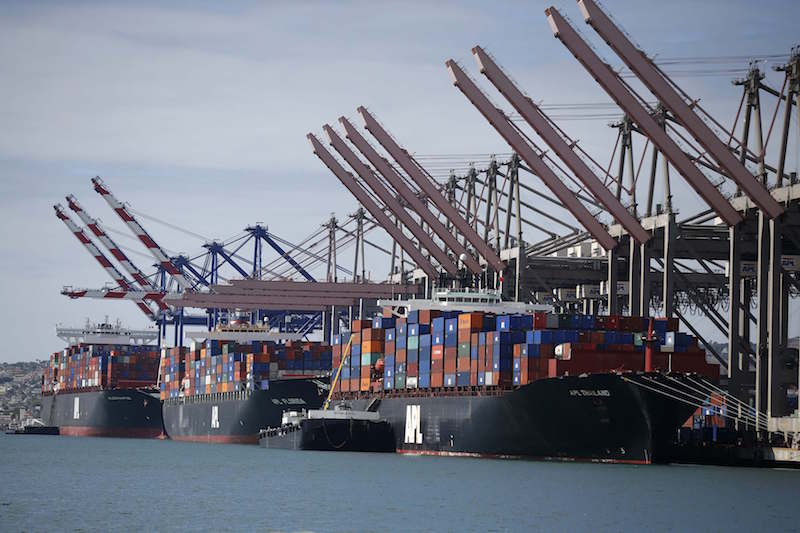Major Cocaine Bust: UK Border Force Seizes Record Shipment at London Gateway
In one of the UK’s largest drug seizures of the past decade, UK Border Force officers have seized cocaine with an estimated street value of £96 million (USD 130 million)...

Container ships sit in berths at the Port of Los Angeles, California October 15, 2014. REUTERS/Lucy Nicholson
LOS ANGELES, Dec 15 (Reuters) – The union for 20,000 dockworkers and a group of their employers at 29 U.S. West Coast ports say they are making slow but steady progress in months-long contract talks seen by the shipping industry as a contributing factor in chronic cargo backups.
However, neither side has ventured to say how much longer it might take to reach a settlement, and both parties continued to abide by a news blackout on the details of their talks and the issues that divide them.
The International Longshore and Warehouse Union and the Pacific Maritime Association, representing terminal operators and shipping lines at the ports, opened their talks in May and mutually agreed to keep negotiating after their old contract expired June 30.
The parties said in August they had reached a tentative deal on healthcare benefits, “but apart from that everything else remains on the table,” association spokesman Steve Getzug said.
Since resuming talks after a hiatus in November, negotiators have met on a fairly regular basis, they said.
“Both sides are working hard, and every day they get a little more done, and every day they get closer to a settlement,” union spokesman Craig Merrilees said.
“Any time you’re meeting and talking, that’s progress,” Getzug said.
Ninety union delegates from all 29 ports were expected to review the status of talks when they convened on Monday in San Francisco for a caucus, Merrilees said, adding that the session may be adjourned early to allow negotiations to resume.
DELAYS AND DIVERSIONS
Management sees an eventual settlement as key to easing severe cargo delays that began in mid-October at several container ports that account for nearly half of U.S. maritime trade and over 70 percent of imports from Asia.
The congestion has been most pronounced at Los Angeles and Long Beach, the nation’s two busiest shipping hubs, which together handle 43 percent of all container cargo entering the United States.
The number of freighters stuck waiting at anchor for berths to open in Los Angeles and Long Beach has ranged from about a half dozen to 18 on any given day since backups began. Seven ships were waiting at anchor on Monday, down from 13 on Friday, port officials said.
Management has accused the union of orchestrating some slowdowns to bolster leverage at the bargaining table. Union officials deny organizing delays but acknowledge some dockworkers may be acting on their own out of frustration over the pace of contract talks.
They point to other factors that port officials cite as the main causes of gridlock. Chief among them is a shortage of tractor-trailer chassis used for hauling cargo from the ports to warehouses, a situation created when shippers decided to sell off their chassis to third-party equipment-leasing companies.
Union and port officials also point to record import levels, rail service delays and the advent of super-sized container vessels delivering greater cargo volumes all at once.
The port slowdowns, coming just after the peak holiday shipping season, have nevertheless rippled through the commercial supply chain, with prolonged days in the delivery of goods ranging from apparel to apples and grain.
Cargo that normally takes two to three days to clear the ports now faces lag times of up to two weeks, and shipments of some goods, such as coffee, are being diverted from the West Coast to other ports, like Houston.
Los Angeles port spokesman Phillip Sanfield said congestion was starting to ease and that the backlog hopefully will be cleared before the next heavy cargo season in February.
Insisting that labor tensions are distracting from efforts to ease the cargo crunch and could lead to a worsening situation, the National Retail Federation has urged the White House to appoint a federal mediator to help settle the talks.
The union has opposed mediation, Merrilees said, because the two sides are still making headway. Getzug said management was open to the idea. (Reporting by Steve Gorman; Additional reporting by Josephine Mason; Editing by Eric Beech)
© 2014 Thomson Reuters. All rights reserved.

Sign up for gCaptain’s newsletter and never miss an update

Subscribe to gCaptain Daily and stay informed with the latest global maritime and offshore news


Stay informed with the latest maritime and offshore news, delivered daily straight to your inbox
Essential news coupled with the finest maritime content sourced from across the globe.
Sign Up